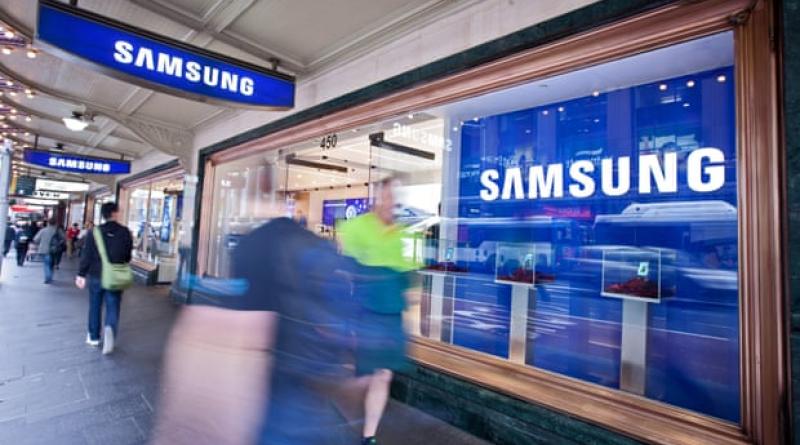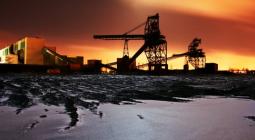Samsung investment in Adani's Australian coal operation prompts call for boycott.

Activists protest at Samsung Electronics store in Sydney over debt purchase by affiliate Samsung Securities.
A company in the Samsung Group invested in Adani’s Australian coal operation last year in a deal that has prompted environmental activists to call for a boycott of the Korean conglomerate’s flagship electronics products.
Samsung Securities, a publicly-traded brokerage and part of the broader group of affiliated companies that includes Samsung Electronics, purchased a share of $120m of debt in the Adani-owned Abbot Point coal terminal last year with another Korean firm.
The investment was briefly mentioned in Korean-language media outlets in September but has not otherwise been made public.
Adani’s efforts over about two years to refinance the debts at the Abbot Point terminal have been significant to its progress on the related Carmichael mine and rail project.
The port will be used to ship coal from Adani’s under-construction thermal coal mine in the undeveloped Galilee basin, considered by some to be the most controversial coal project in the world.
In a statement to the Guardian, Samsung Electronics said it was “a separate corporate entity from Samsung Securities and has no connection to Adani”.
Samsung Securities is a Korea Stock Exchange-traded company listed online as an “affiliate” of others in the Samsung conglomerate. Shareholder lists show how the companies have multiple common owners and complex links to others in the group.
Samsung Securities is 30% owned by Samsung Life Insurance, which in turn is majority-owned by Samsung figurehead Lee Kun-Hee, Samsung C&T and various over Samsung entities.
Lee, Samsung Life Insurance and Samsung C&T are three of the four largest shareholders in Samsung Electronics.
The Adani investment by Samsung Securities has placed the consumer tech arm of the group firmly in the sights of an activist movement that has led boycotts of financial institutions, insurers, engineering firms and other businesses that have dealings with Adani in Australia. This is despite Samsung Electronics not having made any investment in Adani.
Members of the school climate strike movement held a first protest outside a Samsung store in Sydney on Wednesday, including a pledge to boycott Samsung products, including its market-leading televisions and smartphones, until the affiliate company ends its relationship with Adani.
One of the strikers, Bailey Linton-Simpkins, 15, said Samsung would suffer the consequences of brand damage “that comes with being associated with Adani’s toxic product”.
“Young people will not stand for companies that [indirectly] fund the climate crisis and will refuse to buy Samsung products if [their affiliate does] not commit to no further financing of Adani’s coal project,” he said.
“Samsung is trashing its reputation by shackling this iconic brand to Adani’s climate wrecking coal project.”
Samsung Securities’ investment was made after several years of campaigning by activist groups, who effectively prevented Adani from gaining the financing it required to build a 60m tonne-a-year coalmine.
When efforts to find investors failed, Adani announced in late 2018 it would self-fund a much smaller mine and rail project, where coal would be sent to Abbot Point for export to India.
That announcement followed longstanding efforts to restructure the debt at Abbot Point; an endeavour that has relied upon Korean firms while others declined to be involved.
In 2018, Korean firm Mirae Asset Daewoo bought the entire $330m senior debt, in a deal widely viewed as critical to Adani’s broader Australian coal operation.
The following year, Abbot Point subordinate debts worth about $208m were bought by three Korean companies, including Samsung Securities. It is understood Samsung Securities jointly bought about $120m in debt with Hanwha Investment and Securities, which they intended to on-sell to investors.
Other Australian activist groups, including Market Forces and Bushfire Survivors for Climate Action, have written to Samsung and other Korean investors urging them to provide no additional funding or support to Adani or Abbot Point.
Several Korean institutions have already committed not to become involved.
“Abbot Point coal port is an essential part of the disastrous Carmichael coal project; without it, the new mine would not be able to export the coal,” Market Forces campaigner Pablo Brait said.
“Any funding of Abbot Point is therefore considered support for the Carmichael project – a project that could destroy our chances of keeping global warming below 1.5C.”
The Commonwealth Bank and Westpac had previously loaned the port $170m, which was due in November this year. However, it appears CBA is no longer involved with the terminal.
In answers to questions on notice in the House of Representatives standing committee on economics, CBA said it no longer had a loan to Abbot Point.
“We have not been asked to extend capital to this project at this time,” the bank
Adani said in a statement the specific details of its funding arrangements for the terminal were commercial-in-confidence, but that it had repaid $100m in debt on Abbot Point before its May maturity date.
“We have postponed refinancing debt maturities due late this year and next year due to prevailing market conditions,” a spokeswoman said.
“These debt facilities were placed more than six years ago.
“Abbot Point terminal is a critical infrastructure asset that has been operating safely for over 35 years, exporting coal from Queensland’s Bowen basin for some of Australia’s leading coalminers.
“Legitimate law-abiding businesses should be able to conduct their day-to-day business free of harassment.
“We are all for people having their say, providing they do it in a respectful and legal manner. However, these activists do not speak for everybody in the community, and it is un-Australian to have a minority group put businesses and their employees at risk when they deserve a fair go.”
Samsung Securities was also contacted for comment.
16 July 2020
The Guardian





